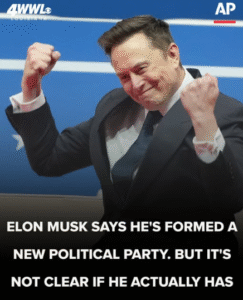Elon Musk announced over the July 4 weekend that he is forming a new political organization called the “America Party,” aiming to challenge what he calls a broken two-party system. The declaration came amid his escalating criticism of both Republicans and Democrats, particularly in response to a recent federal tax and spending bill that he called financially irresponsible. Musk claims the America Party will focus on restoring fiscal sanity, promoting innovation, and protecting individual freedoms.
In his posts on X, formerly Twitter, Musk said the new party would target competitive congressional races, especially in the 2026 midterm elections. He outlined plans to influence two or three U.S. Senate seats and up to ten House races, with the goal of tipping close contests and becoming a deciding force in key legislative decisions. Musk’s messaging emphasized a populist and tech-driven vision, promising to cut through what he described as elite gridlock and partisan dysfunction.
Despite the high-profile announcement, it’s unclear whether the America Party exists in any formal or legal sense. As of now, no official filings with the Federal Election Commission have been found that establish the America Party as a recognized political organization. Several filings bearing similar names have surfaced in federal records, but many appear dubious, with false addresses, missing contact information, or unverifiable email accounts. Musk himself disavowed at least one such filing, stating that it was not affiliated with him.
Political experts have pointed out that forming a viable third party in the United States is extremely difficult. Beyond securing national recognition, a new party must achieve ballot access in all fifty states, comply with complex state laws, and build grassroots infrastructure. Without these foundational elements, a party can’t field candidates or receive federal matching funds. Musk has not provided any details on how he plans to tackle these logistical and legal hurdles.
Critics have also questioned Musk’s political viability. While he enjoys significant visibility and influence in the tech and business worlds, polling data suggests he faces high unfavorability among American voters. Analysts point out that his brash online persona and controversial statements could alienate potential supporters. Others argue that his political foray could distract him from his responsibilities at Tesla, SpaceX, and other ventures.
Meanwhile, supporters of Musk’s initiative view the America Party as a potential disruptor to a stagnant political system. They applaud his focus on reducing federal debt, advancing technological innovation, and encouraging higher birth rates through pro-family policies. His online following remains vast and loyal, offering a digital platform that few political newcomers can rival.
Still, until concrete steps are taken—such as candidate endorsements, legal filings, or state-level party organization—many observers remain skeptical. At this stage, the America Party seems more like a bold idea or branding exercise than a functioning political force. Whether Musk intends to fully commit to building a new party or is simply using it to influence national conversations remains to be seen.


